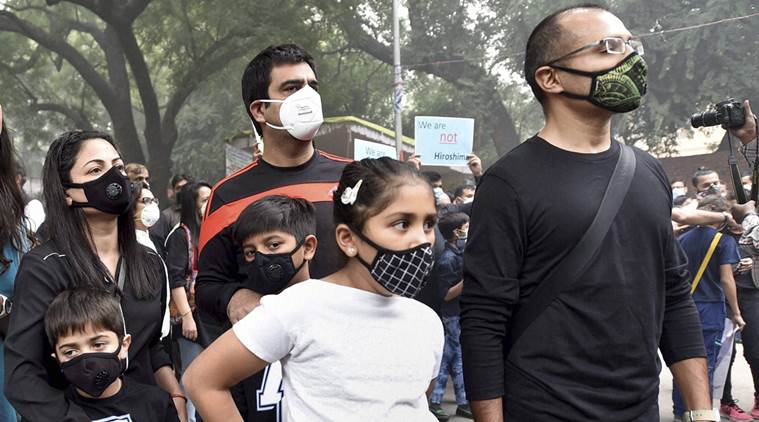Stay updated with the latest - Click here to follow us on Instagram
Delhi government set to install outdoor air purifiers
The Deputy CM also ordered that DPCC conduct the five following studies regarding air pollution along with NEERI, which will result in concrete deliverables, helping the Delhi Government to curb the menace of air pollution.
 A group of citizens protest against air pollution at Jantar Mantar in New Delhi on Sunday (PTI Photo by Kamal Singh)
A group of citizens protest against air pollution at Jantar Mantar in New Delhi on Sunday (PTI Photo by Kamal Singh)
As pollution levels in the city touched “severe” levels again on Tuesday, the Delhi government said it was going ahead with its plan to install outdoor air purifiers.
Deputy Chief Minister Manish Sisodia directed officials of the Public Works Department (PWD) to immediately install induced-draft air treatment systems at five major traffic intersections in the city, in collaboration with NEERI and IIT Bombay.
The purifiers will be installed at five major traffic intersections — Anand Vihar, ITO, Sarai Kale Khan, Kashmere Gate and IIT (Delhi)/AIIMS.
Watch what else is making news:
The order was issued following a meeting, which was attended by Environment Minister Imran Hussain as well as officials of the PWD and Environment departments and the Delhi Pollution Control Committee (DPCC).
The purifiers are based on patented technology that will push air into the filtration system and purify it.
The government had first floated the plan earlier this month, when air quality in the city dipped after Diwali.
Environmentalists and some government officials have questioned the feasibility of the plan, arguing that air purifying technology is not effective in the open. Government officials, however, maintained that the technology has been very effective during trials in Maharashtra.
The government said outdoor air purifying units (induced-draft air treatment systems) have the potential to reduce carbon monoxide and particulate emission by 40 per cent to 60 per cent in a 20-30 m radius during peak traffic hours.
“A pilot study executed in IIT Bombay on JVLR Road shows reduction of 55-76% for PM 2.5 and 73-88% for PM 10. Air quality sensors, anemometers, cameras and counters will be mounted on these units for better mapping, which will enable robust data assimilation and analysis. This step will also execute directions of the Central Pollution Control Board (CPCB) to DPCC, which require action on creating green buffers along traffic corridors, and reduce kerbside pollution… ,” said a statement issued by the government.
Sisodia also ordered the DPCC to study the feasibility of using cow dung, sewage sludge, alum sludge, tiles, bricks and other items to make pellet fuel (used as home heaters).







